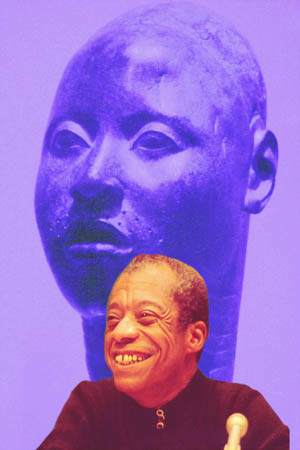
photographic art by Ted Pontiflet, Oakland CA, Joyce Gordon Gallery Exhibit
Marvin X confesses, "After I saw Ted Pontiflet's photographic art of James Baldwin,
I had to reconstruct my esthetics of Blackness and admit that no matter how much I had
imagined James Baldwin as an ugly man, yet positioned with African sculpture in the background, I was forced to say he was beautiful in the African esthetic tradition, thus cast out my
Eurocentric esthetics or concept of beauty."
In my December, 1968, interview with James Baldwin at his New York apartment, yes, without heat, he told me a host of things on Blacks in America and throughout the world, especially those ex-patriots in Paris, in particular Richard Wright, the man he dethroned as the heavy weight champion of Black literature. I will get to his comments on Richard Wright in a moment, but one of the most important things he said to me was, It's a wonder we all haven't gone stark raving mad as Black people in America. It's a miracle for a Black father to raise a Black son under these conditions and I applaud the men who are able to do so.
"How can these people talk about the Prince of Peace while they bomb the hell out of the Vietnamese during these Holy Days? Your condition proves they don't believe in the teachings of Jesus Christ!"
It was James Baldwin's script that Spike Lee used to make his film Malcolm X. But in 1968 there were many people who questioned Baldwin's ability to write such a script about a man who symbolized Black manhood. When I asked him about their reaction, he retorted, "Hey, I pay my rent, I write what I want!"
As per Richard Wright, he felt Richard Wright lost his roots in exile; he became disconnected from the reality of Black life in America, even in Africa for that matter. When he went to Africa, he misinterpreted some things that I came to understand about Africa and my relationship to Africa. When I came to understand my father, I understood he was an African priest/preacher transferred to America, and he ruled his church and his family as part of an African village of which he was the king. I don't think Richard understood he was not an African but an American, for better or worse.
I understood this and had no problems with it! I knew I had to make peace with the America nightmare, I had to understand those airless rooms Americans live in." In one of his essays, he wrote, "The idea of white supremacy has led white people to rationalizations so fantastic it reaches the pathological."

No comments:
Post a Comment